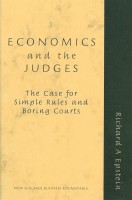
Economics and the Judges: The Case for Simple Rules and Boring Courts
This paper investigates the use of economic theory by common law judges. I shall begin that inquiry by propounding a gentle paradox. Read more


This paper investigates the use of economic theory by common law judges. I shall begin that inquiry by propounding a gentle paradox. Read more

Crime has increased significantly in New Zealand over the past 20 years. New Zealand now has one of the highest burglary rates in the developed world, higher than the United States, Great Britain or Australia. Read more

The purpose of this study, which was supported by the New Zealand Business Roundtable, is to suggest the guiding principles for the reform of the welfare state. Plainly any such task involves taking a view about the ideal of a free society. Read more

It’s a pleasure to speak to an audience which reflects such a wide cross-section of the business community. In fact one of the most pleasing developments of recent years that has accomplished the resurgence of business in this country has been the resurgence of business organisations. Read more
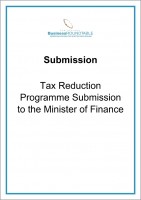
Fiscal matters will be among the most important issues to be addressed by the government over the next few years. An improving fiscal outlook will provide considerable scope to reduce taxes once net debt is reduced to a prudent level. Read more
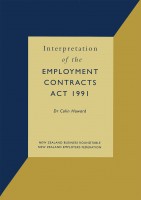
Preliminary observations: The brief I accepted in preparing this report was to comment on employment law developments in New Zealand since the Employment Contracts Act 1991 (‘the ECA’) commenced operation on 15 May 1991. The ECA has major political, social, and economic, as well as legal, significance. Read more

There are many aspects of the global picture I might cover with you today. But I would prefer to deal with one particular aspect at length so I propose to talk mainly about why the concept of the United Europe has become a threat to New Zealand, and what we can do about it. Read more

After an introduction like the one delivered by Douglas Myers, sometimes the safest thing to do is to sit down. It has been five and a half years since I last visited here, and I am happy to report that the changes in the mood that I have seen in New Zealand, and in its physical surroundings, have been palpable. Read more
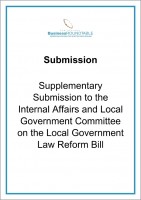
This submission on the Local Government Law Reform Bill (“the Bill”) is made jointly by the Auckland Regional Chamber of Commerce & Industry, the Building Owners and Managers Association of New Zealand (BOMA), Federated Farmers of New Zealand, the New Zealand Business Roundtable (NZBR), the New Zealand Manufacturers Federation and the Wellington Chamber of Commerce. It is in response to the September 1995 submission made by the New Zealand Local Government Association (“the LGA’s submission”). Read more

This submission considers to what extend, and at what cost, the bill may further objectives of the education system. We note that until 1991, the registration regime for teachers was compulsory. Read more

It’s hard not to feel good about the current business environment in New Zealand. Most of us in business today are, for the first time in our lives, part of a successful economy. Read more
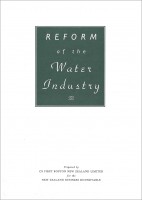
This report examines the potential for reforming the water industry. It focuses on mechanisms for allocating water between different uses as well as the institutional arrangements governing businesses that supply water and wastewater services. Read more
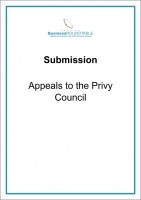
This submission by the NZBR responds to the Attorney-General's invitation for comment on the report of the Solicitor-General, Appeals to the Privy Council (released on 5 May 1995), which is referred to as the "Report". The Report is understood to have been sought by the government to assist it in making an 'in principle' decision on whether or not to retain the availability of appeals to the Privy Council. Read more
